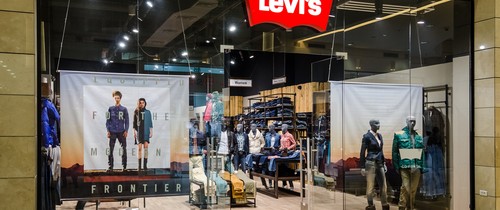Levi Strauss Works With Suppliers to Help Workers, Cut Water and Energy Use
Levi Strauss & Co. is combining a project to foster the wellbeing of factory laborers with the manufacture of its new Dockers Wellthread khakis, a product line that emphasizes sustainable design and environmental practices.
The San Francisco-based jeans company is piloting a program to improve apparel workers’ lives, and using one of the plants involved to make the Wellthread clothes. The pilot project supports programs to help workers in factories around the world, using their ideas to create initiatives to meet regional needs, Levi Strauss says.
The company on Nov. 7 unveiled the Dockers Wellthread concept, which it calls “a sustainable design and production process that benefits consumers, apparel workers and the environment.” In addition to improving factory workers’ lives, the process aims to create a smart, sustainable design that improves garment durability, and to reduce environmental effects by using water, material and energy efficiently, Levi Strauss says.
“How you make a garment is just as important as the garment itself,” Michael Kobori, Levi Strauss vice president of social and environmental sustainability, said in a company press release. “Our company has been guided by the same principles since its founding 160 years ago. We believe that we can use our iconic brands to drive positive sustainable change and profitable results. Progress is in our DNA. We invented a category and with that comes the responsibility to continually innovate for each new generation of consumers.”
A Levi Strauss case study says the Dockers Wellthread line marks the first time a company has woven sustainable design, environmental conservation and worker wellbeing into product development. The company says it will pass savings to consumers in the form of a 30 percent lower price on Wellthread khakis.
Aiming to use durable materials, the Wellthread designers looked at clothing from Levi Strauss’s archives and made a pilot group of khakis, jackets and T-shirts, the company said. They reinforced the garments’ stress points, strengthened buttonholes and made the pockets more durable, according to Levi Strauss.
Suppliers worked with the Dockers supply team to cut water and energy use, which they achieved with a new garment-dyeing process that uses cold-water pigment dyes for tops and salt-free reactive dyes for pants and jackets, and order-based factory rather than mill dyeing, according to the company. Anticipating that fabric-recycling facilities eventually will become widely available, Levi Strauss also developed a long-staple yarn for its premium Wellthread twill. The pants design also includes a “locker loop” for line drying.
The Wellthread line with become available in the spring, and is being pursued on a relatively small scale now as the company researches how to extend the process to future Levi’s and Dockers collections.
The company already has a line of jeans made from recycled plastic bottles and another made using a lower water-usage process.
The Dockers Wellthread project originated with the Aspen Institute’s First Movers Fellowship program.





